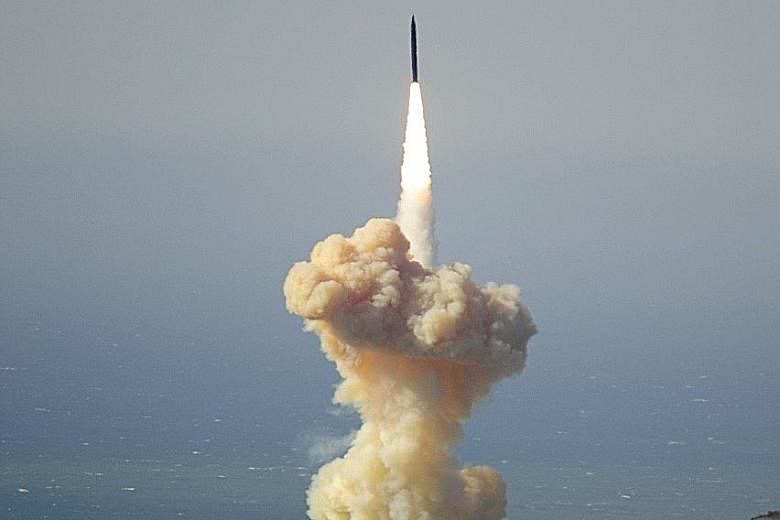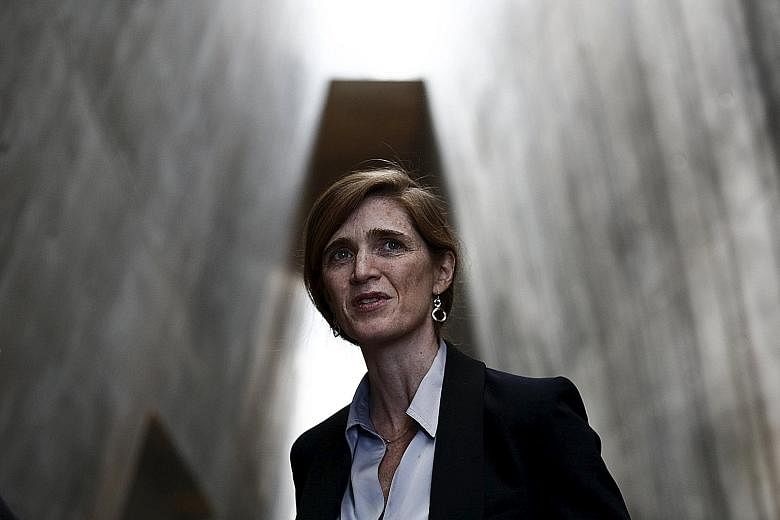UNITED NATIONS • The United States has presented a draft United Nations Security Council resolution it negotiated with China that would dramatically tighten existing restrictions on North Korea after its Jan 6 nuclear test and create the toughest UN sanctions regime in more than two decades.
This was as the US military test-fired its second intercontinental ballistic missile in a week late on Thursday to demonstrate the reliability of American nuclear weapons at a time of rising strategic tensions with countries such as Russia and North Korea.
The unarmed Minuteman III missile blasted off from a silo at Vandenberg Air Force Base in California shortly before midnight, headed towards a target area near Kwajalein Atoll in the Marshall Islands, in the South Pacific.
Deputy Defence Secretary Robert Work said the tests, conducted at least 15 times since January 2011, send a message to strategic competitors such as Russia, China and North Korea that Washington has an effective nuclear arsenal.
The draft resolution, presented the same day the missile test took place, would require UN member states to conduct mandatory inspections of all cargo passing through their territory to or from North Korea to look for illicit goods. Previously, they were required to do so only if they had reasonable grounds to believe there was illicit cargo.
Diplomats said that the US used the nearly two months of bilateral negotiations that at one point involved President Barack Obama and his Chinese counterpart to win China's support for unusually tough measures intended to persuade its ally North Korea to abandon its atomic weapons programme.
-
Draft resolution highlights
-
CONVENTIONAL ARMS
Full arms embargo against North Korea, including a new ban on the transfer to North Korea of any item that could directly contribute to the operational capabilities of its armed forces, like trucks that can be modified for military purposes.
NORTH KOREA'S NETWORKS
States are required to expel North Korean diplomats who are involved in illicit activities.
INTERDICTION PROCEDURES
States must inspect on their territory all cargo going to or coming from North Korea via land, sea or air; ban all flights suspected of carrying prohibited items; ban all port calls by vessels suspected of engaging in illicit activities; ban chartering of their vessels or aircraft by North Korea, except for "livelihood purposes".
RESOURCES
Ban on the supply or transfer to North Korea of aviation fuel, including rocket fuel; ban on export of gold, titanium ore, vanadium ore and rare earth minerals; ban on export of coal, iron and iron ore, except for "livelihood purposes".
FINANCIAL SANCTIONS
States must freeze the assets of North Korean entities linked to the nuclear and missile programmes; ban the North's banks from opening branches on their territory; ban their banks from opening new offices in North Korea; close existing financial activities in North Korea if these could contribute to its nuclear or missile programmes.
NUCLEAR, MISSILE PROGRAMMES
States must prevent the transfer of any item that could contribute to its nuclear or ballistic missile programmes.
FIVE ANNEXES
They include blacklists of North Korean individuals and entities involved in illicit activities; technical items that can be used to advance these activities; and luxury items.
REUTERS
The proposal would close a gap in the UN arms embargo on Pyongyang by banning all weapons imports and exports. There would also be an unprecedented ban on the transfer to North Korea of any item that could directly contribute to the operational capabilities of the North Korean armed forces, such as trucks that could be modified for military purposes.
Other proposed measures include a ban on all supplies of aviation and rocket fuel to North Korea, a requirement for states to expel North Korean diplomats engaging in illicit activities, and blacklisting 17 North Korean individuals and 12 entities, including the National Aerospace Development Agency, the body responsible for a rocket launch earlier this month.
US Ambassador to the United Nations Samantha Power told reporters that the new measures, if approved, would be "the strongest set of sanctions imposed by the Security Council in more than two decades". She said they were aimed at the North's leadership, and "careful not to punish the North Korean people".
Several council diplomats predicted a meeting today to adopt the draft, but Russia's deputy UN envoy Petr Iliichev said Moscow needed time to study it and the earliest likely vote would be next week.
The draft was the result of seven weeks of tough negotiations between the US and China. "This is a very robust resolution," a US official said on condition of anonymity. "Clearly, this took a long time... it was a difficult process."
North Korea has been under UN sanctions since 2006 because of its multiple nuclear tests and rocket launches. China and the US had differed on how strongly to respond to Pyongyang's most recent test, with Washington urging harsh punitive measures and Beijing emphasising dialogue and milder UN steps confined to non-proliferation.
The Global Times, an influential Chinese tabloid published by the ruling Communist Party, said in an editorial that North Korea "deserves the punishment" of new sanctions, but China should "cushion Washington's harsh sanctions to some extent".
REUTERS


